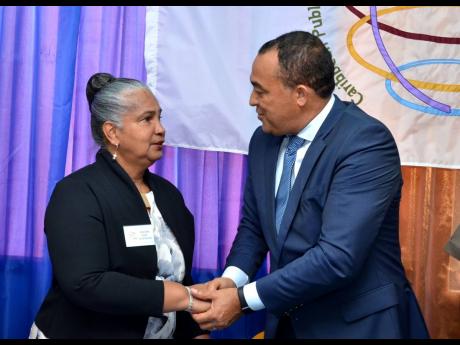Health ministry to modernise registration process for pharmaceutical drugs
The Health ministry is undertaking a review of the registration process for pharmaceutical drugs in an effort to achieve a more modernised system.
Health Minister Dr Christopher Tufton says the process of modernisation will include the digitisation of records to reduce the average timeline taken to register a drug. The minister was addressing the opening of a two-day meeting on post-market surveillance and the Caribbean pharmaceutical policy, at the Medicines Quality Control and Surveillance Department of the Caribbean Public Health Agency (CARPHA) at Hope Gardens, St Andrew, on Tuesday.
Tufton asserted that vigilance is required for drug companies desirous of having a foothold in Jamaica and that there should be standardisation in the registration of drugs for those companies.
“They must be reputable, monitored and registered so that they can appreciate the continuation of established standards,” he said.
Tufton argued that post-market surveillance of pharmaceuticals is critical in guarding against the possibilities of errors of abuse in the interest of populations across the Caribbean.
The minister emphasised that a collaborative effort is needed from the Caribbean in this regard.
“We have a duty to protect our population. The way the drug market is configured between the original [medication] and the generics, which follow over time ... you really have to sieve through to determine what is what and what is in the best interest of those we serve,” he said.
Tufton said that according to data, over the last six months, on a monthly basis, more than 200 adverse drug-reaction reports were submitted locally to the Pharmacovigilance Unit of the ministry.
Meanwhile, director of the Surveillance, Disease Prevention and Control Division at CARPHA, Dr Virginia Asin-Oostburg, said post-market surveillance is a novel programme and will be further shaped through close collaboration with member states and other agencies.
For her part, sub-regional programme coordinator for the Caribbean at the Pan American Health Organisation (PAHO)/World Health Organization, Jessie Schutt-Aine, said a strong regulatory system is the foundation for a strong health system, which is needed for universal health.
“PAHO has been working on these issues for many years, supporting the development of the Caribbean Pharmaceutical Policy, as well as the road map for a regional regulatory platform. More recently, PAHO has been working quite closely with CARICOM, CARPHA and member states to advance implementation of the Caribbean Regulatory System,” she said.
The registration of drugs and other items or products is the major regulatory function executed through the Pharmaceutical and Regulatory Affairs Department of the health ministry.
The process involves in-depth scientific evaluation of the technical documentation submitted in support of registration, resulting in the licensing of a drug or other related products.
It is one of the primary mechanisms through which the quality, safety and efficacy of drugs and other products mentioned in the Food and Drugs Act and Regulations are ensured.

